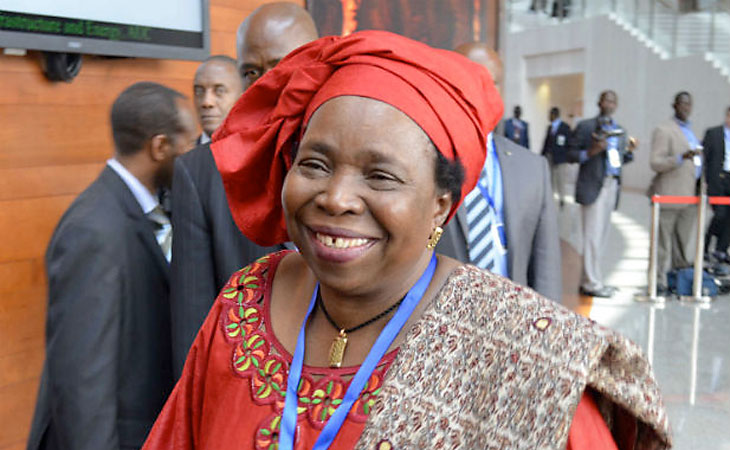Home » Tribute PAWO
Tribute to the Pan African Women’s Organization (PAWO)
by Mzuri Pambeli

Dr. Nkosazana Dlamini Zuma, Chairperson of the African Union
To the mothers, sisters, aunties and grannies who fought to the liberation of our land and the upliftment of African Women, we salute you.
The Pan African Women’s Organization was founded in 1962 in Tanzania, East Africa, one year before the founding of the Organization of African Unity! The struggle for independence in Africa (an throughout the diaspora) lends itself to the realization that liberation for the nation does not necessarily equate to liberation for the African woman because liberation is a process of breaking down social and cultural barriers and traditions that have held us down.
These women realized that and took on the responsibility to create an organization to unite sisters from all the liberated nation-states throughout Africa, to build closer relationships, share stories, struggles, victories and to gain insight on common solutions. What a great example to follow!
They took on the total liberation and unification of the African continent, the elimination of apartheid and the building of justice and strengthening of humanity for true liberation became their priorities. So on July 31, 1962, the Conference of African Women (CAF) founded Pan African Women’s Organization, the continent’s first collective women’s organization. After the conference in 1974, African Women’s Day was founded.
These women realized the hurdles of freedom and took on the responsibility to create an organization to unite sisters from all the liberated and struggling nation-states throughout Africa to build closer relationships, share stories, struggles, victories and to gain insight on common solutions.
What a great example to follow! And what a great reason for Africa Women’s Day.
Today we are celebrating the 50th anniversary of PAWO and the merging of Pan African Women’s Day July 31st and South African Women’s Day August 9th to bring African women together from the length and breathe of the African liberation struggle continue this work, this discussion and to help move our liberation movement forward. In an interview with Dr. Dlamina Zuma, chairperson of the African union, she explains the great strides made in these 50 years of existence.
- Education for girls and women has greatly improved. There is more opportunity for women and girls throughout the continent and both on a local and national level, young females are attending schools or receiving some level or educational training or vocational training than ever before.
- There is greater access to health resources. Women’s health resources are scarce throughout the so called 3rd world and in Africa, it is even more of a challenge but through local clinics, increased training or health care workers (thanks to countries like Cuba and Venezuela who have clinics and trained personnel in various parts of Africa and the diaspora), we are receiving prenatal care, services during child birth, immunizations, access to medicines for malaria and HIV (two of the most prolific diseases striking the continent) and access to clean water is ever increasing.
- Women have greater access to business and professions in business and politics. Women are entering politics once again. During the liberation movement, African women played a significant role in the political movements for liberation as well as fighting in the armed struggles in areas like Mozambique, Angola and Guinea Bissau but after independence, the roles and positions of women were not clearly available. That has changed over the years through the engagement of women in PAWO and taking those issues back to their particular nation –states.
- In this decade of the African Women, we must determine what we want to achieve and continue to build upon that work. It did not take just a decade to change our status in Africa and throughout the world. It will take more than a decade to transform our reality and that of Africa. As Nkrumah reminds us ‘the development of a Nation can be measured by the political maturity of its women.’ Our development as Africans will be measured by the development of women’s roles in every facet of the struggle for liberation as a guarantee towards that very freedom!
- 5) African women’s organizations have multiplied and need to get stronger. It is clear from the progress made that women’s role, her power and her position in African society is improving although still a challenge. We must all contribute how we can- where we can- in all areas to assist in the upliftment of women.
Only through organization and regular engagement in the issues facing us as girls and women will we gain greater experience and make greater advancements. This impacts not only our local areas but expands the struggle on a social and political level for Pan Africanism to truly manifest!
FORWARD TO THE WORK OF THE PAN AFRICAN WOMEN’S ORGANIZATION AND ALL AFRICAN WOMEN’S WINGS AND ORGANIZATIONS.
FORWARD TO OUR GREATER UNITY AND SISTERHOOD!
FORWARD TO THE INSTITUTIONALIZATION OF AFRICAN WOMEN’S DAY THROUGHOUT THE DIASPORA!
FORWARD TO PAN AFRICAN WOMEN’S DAY 2013!!!

